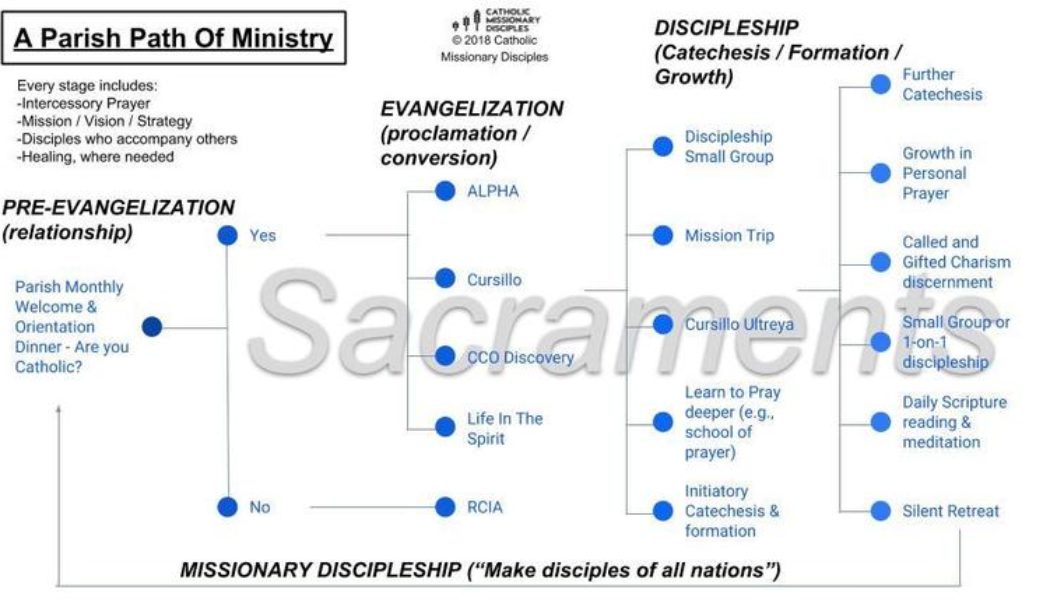Imagine building a house without a plan or even a piece of complex furniture without following directions. It is nearly impossible for almost all of us. We need plans and directions, because while we may know some elements of what it takes to build a house or assemble furniture – without directions or some kind of a blueprint we are much more likely to fail in our goal of ending up with something the way we want it.
Yet, this is how most parishes operate. Without a clear long-term plan on how to build disciples, they try to “make disciples” as they go – and when things don’t go as expected (e.g., there isn’t much fruit), they don’t know why things went wrong.
Jesus summed up this way of operating this way:
“Now great multitudes accompanied him; and he turned and said to them, “If any one comes to me and does not hate his own father and mother and wife and children and brothers and sisters, yes, and even his own life, he cannot be my disciple. Whoever does not bear his own cross and come after me, cannot be my disciple. For which of you, desiring to build a tower, does not first sit down and count the cost, whether he has enough to complete it? Otherwise, when he has laid a foundation, and is not able to finish, all who see it begin to mock him, saying, ‘This man began to build, and was not able to finish.’” -Luke 14:25-30
In other words – making and growing disciples requires a plan. With this in mind, try asking yourself a few questions.
- What is your parish’s plan for evangelizing the non-disciples at your parish?
- How are we reaching the community to fulfill the mandate to “make disciples of all nations”?
- What do we do when someone wants to join the parish?
- Do we have an intentional plan on making and growing disciples?
- If not, why not?
- If so, do we use it?
Very few parishes have an intentional plan of action for how we determine where someone is and how to move them to the next step in their journey.
Before you go any further, familiarize yourself with our pathway of discipleship. It is the way in which we can start to discern where we (and others) are on our journey with Jesus. Once you are familiar with this pathway, then the planning process below will make more sense.
It isn’t enough to know where someone is and what they need, though that is where we need to start. We also need to have a plan on how we then move someone along the path, in the context of parish ministries. Part of the process needs to be discernment of what each person needs, so that it is all built on communication and relationships. As we stated in the post on the pathway of discipleship – people don’t neatly fit into our categories we assign them to. So, be open to what God wants of each person and not stuck to merely implementing a plan.
The people are the reason we do ministry – not the plan!
With that being said, I want to offer a diagram and try to explain what a Parish path of ministry might look like (click on the image to expand):
A few notes on the plan:
-
Notice that every stage should include the following:
-Intercessory Prayer
-Mission / Vision / Strategy
-Disciples further ahead on the path to accompany others
-Healing, where needed - The Sacraments undergird every part of our ministry.
- The examples of what may be a part of each category (e.g. – Alpha, CCO Discovery, etc. which are under “Evangelization”) are just that, examples. There are many ways in which we could use a programmatic element in each stage – but nothing replaces relationship and organic evangelization (i.e. evangelization that takes place naturally in the life of a disciple outside the parish walls).
- The plan is meant to overcome some of the assumptions we make in our parishes, such as:
-Those who are “involved” have already had a conversion to Jesus.
-We need to do everything, even if it doesn’t fit our mission.
-Catholic parishes just don’t operate with a plan. - The goal is to move people intentionally through the process of spiritual conversion and maturity. Without a plan, we will operate with a hodge-podge of programs, events, and classes. With a goal, we know where someone needs to go and how we can move them there.
- Too often we get comfortable in our spiritual journey. This kind of intentional plan can hold us accountable to keep moving forward – if it is used properly and relationships are oriented toward spiritual growth and maturity.
- The ultimate goal is to become missionary disciples who make other missionary disciples. We can’t just be content to keep all the good stuff to ourselves, we have to share it with others & then equip them to do the same with still others.
This is one part of the process we use with our clients at Catholic Missionary Disciples. If you feel this is what you would like your parish to look like (& are a staff member or pastor of the parish), then we would love to help you make it a reality.
Join Our Telegram Group : Salvation & Prosperity










